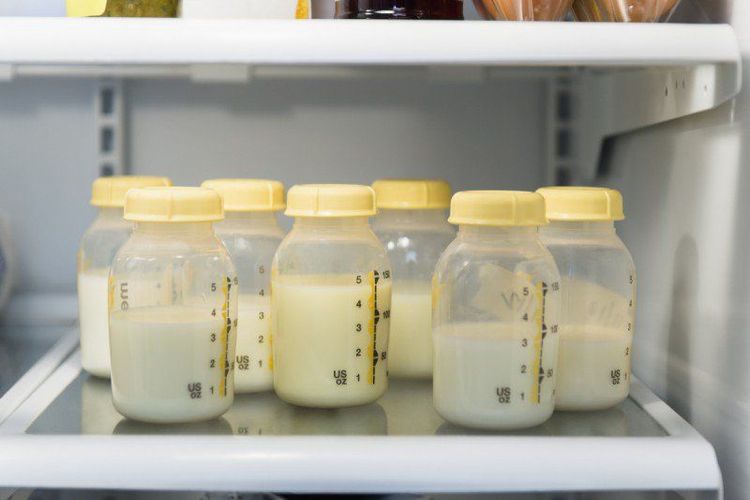This is an automatically translated article.
The article is professionally consulted by Master, Doctor Doan Ngoc Quynh Tram - Department of Pediatrics - Neonatology - Vinmec Nha Trang International General Hospital.
Breast milk after being refrigerated and thawed will have many different odors, such as soapy, rancid or fishy smells. To deodorize frozen breast milk, you should follow all safe breast milk storage guidelines and try some of the ways to get rid of the fishy smell of frozen breast milk suggested below.
1. How to deodorize frozen breast milk
After expressing breast milk, refrigerated and then thawed, there will be some strange smell, which is caused by the process of preventing the growth of harmful bacteria by an enzyme called lipase. The reactions that break down fat and release fatty acids sometimes change the scent of breast milk, but your baby can use it normally without harm if you have frozen breast milk correctly. way .In case the baby still refuses to breastfeed, the mother can rest assured that the baby will use it as usual. On the contrary, if the baby refuses to suckle, you can do the following to deodorize frozen breast milk:
1.1. Mixing milk Mix completely thawed milk with unfrozen milk in a 1:1 ratio to reduce odors, then try breastfeeding; If the child is still uncooperative, increase the percentage of freshly expressed milk in the mixture; After a while, the baby got used to it, the mother gradually reduced the amount of freshly expressed milk when mixing. Note, if the baby refuses to suckle or does not finish suckling, you should not mix freshly expressed milk with thawed milk and then continue to freeze breast milk.
1.2. Deodorizing before freezing In case the above method of removing the fishy smell of frozen breast milk is still not effective, mothers can deodorize before freezing breast milk. How to do this:
Squeeze out the milk and boil it on the stove with very low heat; When the milk begins to bubble around the edges, turn off the heat; Cool and then freeze breast milk as usual. The way to deodorize frozen breast milk as above is very effective in reducing odor, but the disadvantage is that it will cause the milk to lose some of its antibodies. Therefore, it should be noted that absolutely do not boil until the milk boils to limit the loss of nutrients.
2. Notes when freezing breast milk
Experts confirm that freshly expressed breast milk has antibacterial properties, contains more antioxidants, vitamins and fats than milk that has been refrigerated or frozen. But for some reason, you can still express breast milk clean and safe, and then store and store it at room temperature, in the refrigerator, or in the freezer depending on the time. Specific safe storage times are:Room temperature (from 16 - 25°C): From 4 - 6 hours: Refrigerator (≤ 4°C): From 3 - 5 days; Freezer (≤ -18°C): 6 - 9 months; Thawed breast milk: Can be kept for up to 2 hours at room temperature and 24 hours in the refrigerator, however do not freeze again.

Trữ đông sữa mẹ trong tủ lạnh (≤ 4°C): Từ 3 - 5 ngày
Always label the quantity and date of milking so that you can monitor and manage the milk. storage; Gently rotate the bottle to mix the layers of skimmed milk before giving it to your baby, do not stir or shake vigorously to damage the nutritional components of the milk; The milk should be discarded within 1-2 hours after feeding because bacteria from the mouth can get into the milk; To avoid wasting expressed milk and make it easier to defrost breast milk, it is recommended to store milk in small quantities (under 60 ml) and defrost only the portion that needs to be used; Freeze breast milk as soon as possible after expressing; Breast milk should be stored in a special bag or bottle, made from BPA-free materials, some products (such as glass bottles) may crack at too low temperatures; Do not defrost or reheat milk in the microwave and in boiling water, as this can destroy nutrients and cause burns to your baby. Instead, place the bottle or bag of milk in a basin of warm water for a few minutes until the milk is as warm as body temperature (between 37°C and below 40°C). In general, breast milk that has been gently boiled to deodorize before freezing is still enough for the baby to develop, which is also better than using formula that is completely free of antibodies. However, doctors still recommend that parents practice breastfeeding with defrosted milk. If it is not necessary to freeze breast milk, you can express it and store it in the refrigerator for your baby to use gradually.
For more nutritional knowledge and child care for each age, parents should regularly visit the website vimec.com and make an appointment with the leading doctors, pediatric and nutrition experts of the National General Hospital. Vinmec when needing advice on children's health.
Reference source: medela.com














